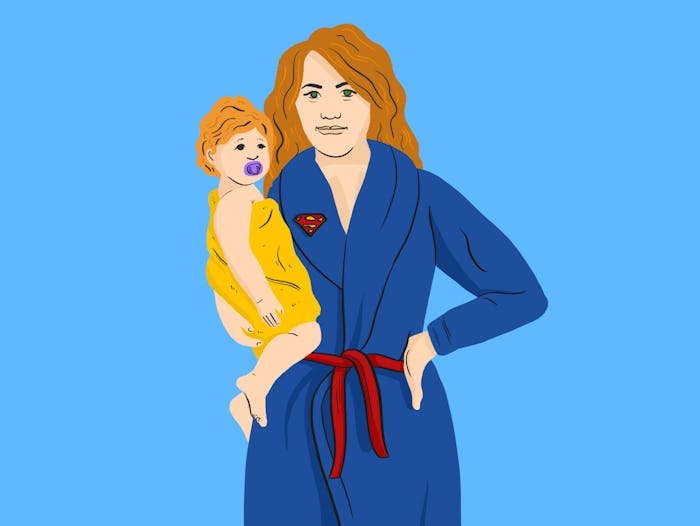
6 Powerful Lessons Survivors Of Postpartum Depression Know So Well
Out of all the things related to being pregnant, delivering and raising babies, the part that I am most proud of is learning how to overcome postpartum depression. For some women, postpartum depression and/or anxiety hits like a ton of bricks after the baby is born. For others, it kind of creeps up slowly: You have a few good days in the beginning, maybe more, and you think you're in the clear. For me, I got through the traditional "baby blues" stage without feeling blue at all. It was weeks after my baby was born that I felt the walls of my life closing in on me and the fear that my earlier ambivalence toward pregnancy would be rewarded with my new baby dying suddenly.
It was a difficult time, to say the least.
I am just coming out of the darkness that postpartum depression blanketed my life with. I am just starting to feel like myself again, after more than two years of hard times. That’s right, PPD doesn’t always end at the one year mark. And it doesn’t always begin after your baby is born.
It’s been a long haul for me, there’s no question. Postpartum depression was something I was so afraid of, but in the end, I’m incredibly grateful I endured it. Sometimes our darkest moments can lead us to our greatest ones. That’s certainly been the case for me.
Here are some of the other things I’ve learned from pushing my way through PPD and coming out on the other side.
You Can Care For Your Baby Despite Not Yet Having Bonded Yet
I think this was my biggest fear when I was dealing with postpartum depression, and I know lots of expectant moms who've felt the same way. How can you care for your baby if you don't yet love them? Luckily, we really are hardwired to take care of newborns (exceptional cases notwithstanding, of course) and even if we weren't, taking care of a baby is really just a series of things that you definitely can do. The doing of the things is not dependent on a profound emotional connection to the person you're doing them for.
Love For Your Baby Will Eventually Develop, And It Happens At A Different Time For Every Mom
I knew women that were so deep in PPD, they lived day to day, constantly feeling guilty for not yet loving this tiny being they had given birth to. But at some point, invariably, love did develop, and now they get what I get: There is no one "right" time to fall in love with your baby. Some women fall in love the moment they find out they're pregnant, some right when they're kid is born, and for some, it might be nine months later on a random Tuesday. And none of those times is the "wrong" time.
Never Be Afraid Of Asking For — And Accepting — Help
Therapy is your friend. If you have the ability to speak to a professional to help figure out the best way to navigate what you're going through, do it. There is literally no downside.
The Stigma Of Taking Medication Is Not Worth Buying Into
Listen, some women can manage their postpartum depression and anxiety without needing to take meds. That is completely awesome, and I salute you ladies if other things worked for you. I turned out to be in the other category. After holding out for five months after my son was born, and wanting to punch people in the face for much of that time (thankfully, never my baby), I finally started on a drug that was deemed safe for breastfeeding. It changed my life. Again, medication isn't the best treatment for everyone, but what is the best for any mom dealing with this stuff? Keeping yourself completely open to all the possible treatment options. Continuing to suffer just because you're afraid of what pursuing certain kinds of treatment might say about you is senseless.
When People Tell You To Cheer Up, There Are A Few Responses To Choose From
I'm personally fond of the method pictured above, however, others have been known to just smile and nod, then turn away and roll their eyes. Both of these options involve the least amount of energy spent on schooling people who know nothing about PPD.
You Are Stronger Than This Disease
Postpartum depression is a challenging illness to wade through, for so many reasons, but ultimately because it runs counter to what society tells you you should be experiencing when you have a new baby. But let me tell you: There is no one way every "good" mom experiences early motherhood (or any other part of motherhood for that matter). Struggling now does not define you as a person, nor as a mother. And you will get through it. You've got this. If I can do it, so can you. And frankly, once you do, actually raising your baby will feel like a piece of cake. (Oh! Cake helps too. Get some cake, girl.)